|
Some mornings I wake up and I feel like I can change the world. I see the inequities that exist and I know that with some hard work, supportive people, and a plan, I can make a difference. Other days I read the headlines, spend 10 minutes on Twitter, watch the news and I think it's impossible. There is nothing I can do to change anything. Why would I even bother trying? How can one person fix so much that is wrong?
When I saw that the Ontario Bar Association's Women Lawyers Forum was putting on a breakfast program called "Leaders & Changemakers" at the OBA Institute this year, I knew I had to attend. I couldn't miss the powerhouse panel of speakers. I needed to learn how these women became leaders and changemakers without getting discouraged. The February 5, 2020 program was moderated by Pia Hundel (Miller Thomson LLP) and Gabriela Ramo (EY Law LLP), with speakers, Michele Landsberg (Journalist & Activist), Barbara Jackman (Jackman & Associates), Leola Pon (General Counsel, Toronto District School Board) and Anne Posno (Lenczner Slaght). The program started with each speaker talking about her own journey and what made her a “changemaker”. At an early stage in most of their lives the speakers saw inequality and wanted to change the world to be a better place. For Michele Landsberg it was growing up Jewish in a very Anti-Semitic Toronto, and being one of a few female journalists in her day, that set her on the path of becoming a changemaker. Being told to think and act a certain way did not sit right with her. While it was often painful being the one singled out, it “gave her a backbone” and a critical stance on society. It was obvious to her that women were second class, and she wrote an essay at an early age arguing against the use of “he” as the universal pronoun. Ms. Landsberg also spoke about recognizing her own reluctance to new ideas. For example, in the 1970s when people started speaking about sexual harassment, she was skeptical. Then she began to think about the sexual harassment she had experienced. As a journalist, she would take her readers through her own reluctance to new ideas and that enabled them to move along with her. Barbara Jackman grew up thinking she had a say. Ms. Jackman had several siblings and they would vote on everything at family meetings, including bedtimes and chores. She spent her whole childhood trying to get her parents to see her point of view. She also wanted to be able to help people who had problems. This led to Ms. Jackman becoming a lawyer, and as a lawyer, she realized the most vulnerable were the people who did not have status in Canada. She began practicing in immigration and refugee law. Ms. Jackman told us that keeping her clients as her focus was what led to change. She argued significant cases on behalf of her clients that changed the landscape of immigration and refugee law in Canada. But it was important, she said, to recognize all of the cases she lost along the way to make it to the ones that she won. Leola Pon comes from a working class Chinese Canadian family with parents who owned a restaurant and worked long hours. She saw how some customers treated her parents unfairly or took advantage of people who did not speak English very well. Ms. Pon never set a path to make change in life, it evolved over the years with her childhood and early adult years as her foundation: “Being a changemaker assumes you have choices and options. Sometimes you don’t”. Ms. Pon did not start her General Counsel role at the TDSB looking to change the legal department, but there were structural issues. For example, the compensation structure was not adequate. It took three years, but she was able to change the compensation structure for the better. Anne Posno grew up in a family that helped foster her belief that she could accomplish anything. She didn’t think there were any barriers, but she came to realize that there are always new barriers to recognize. Ms. Posno noted that change comes in small steps. She spoke of the “phenomenal” women at her firm and the #ReferToHer campaign which provides a list of "experienced female lawyers to whom you can confidently refer work." Some takeaways from the program:
It was a great way to start the day surrounded by these leaders and changemakers. They reminded me that I don't have to change the world in one day (of course I would feel discouraged if that was my goal!) Instead, I will keep making small changes that are in my power, whether it's as simple as bringing my own travel mug to the coffee shop and not using plastic wrap or paper towels, or writing blog posts and articles calling out bad behaviour, or donating money to good causes, or supporting striking teachers, or voting in all of the elections (including the Bencher election), or being a good ally...These are all things in my control. I can make change, one step at a time. I keep coming back to a quote from Linda Silver Dranoff's book "Fairly Equal: Lawyering the Feminist Revolution" and I think it is a fitting conclusion for this blog post: Be aware of the areas that still require attention, and do what you can to be agents of further change. Speak, as I tried to do, for women who otherwise have no voice . . . I encourage those who follow us to do the same, to never ask “What can one person do?” but rather to say, “This is what needs doing, and this is what I will do about it.” How are you a changemaker? What change will you make?
0 Comments
Recap: "Fostering Women Leadership in the Legal Profession" by the Toronto Lawyers Association5/15/2018 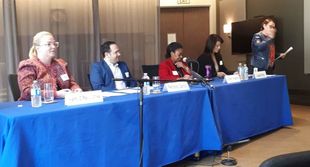 I attended a wonderful evening program at the Toronto Lawyers Association last week that addressed the topic of fostering women leadership in the legal profession. This program was a nice complement to my #WomenLeadingInLaw series and provided some helpful advice on how women can succeed in leadership roles in law. The program was moderated by Edona Vila of Borden Ladner Gervais LLP and the speakers were: Kerry O’Reilly Wilks, Head of Legal, North America & UK, Vale S.A.; Fernando Garcia, General Counsel, Government Affairs and Corporate Secretary, Nissan Canada Inc.; Arleen Huggins, Litigation Partner, Koskie Minksy LLP and head of the firm’s Employment Law Group (as well as the Women's Law Association of Ontario's President's Award winner for 2018); and Leola Pon, General Counsel for the Toronto District School Board. Edona advised that there were two themes the program hoped to address: the first being the leadership journey and progress of women in law, and the second, how to seize opportunities for leadership. Some takeaways from the evening:
Thanks TLA for another wonderful program! 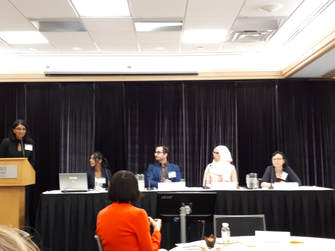 A few weeks ago I attended a program sponsored by the Ontario Bar Association’s Constitutional, Civil Liberties and Human Rights Law section called “Lawyers as Agents for Change: Tackling Hate, Racism, Xenophobia from a Practitioner’s Perspective”. The program’s goal was to have its expert panel unravel key questions from a lawyer’s perspective on how to fight hate and racism, both when our clients are faced with these issues, and when they invade our daily legal practices. The panel consisted of Anita Bromberg (the Director of Advocacy and Engagement, Friends of Simon Wiesenthal Center), Mihad Fahmy (Barrister & Solicitor and Chair, Human Rights Committee, National Council of Canadian Muslims) and Corey Shefman (Olthuis Kleer Townshend LLP). The discussion was moderated by lawyer Richa Sandill (MacDonald & Associates). A few discussion points are summarized below: Rising Tide of Hate or Willful Blindness? The first question addressed was whether there really was a “rising tide of hate” in Canada or whether racism and hate that has always been here has just bubbled to the surface, and now has a spotlight on it? Ms. Bromberg wanted to be “very clear and careful that we don’t blame others for situations we have here in Canada,” alluding to the Trump administration and other racially motivated hate crimes in the United States. For example she referred to an anti-Semitic sign that was painted on an overpass on Highway 400: “That’s not Trump egging this person on. Our first step is to take responsibility that Canada has its hate.” Ms. Bromberg also admitted though that there has been a measurable rise in hate activity, but took the position that someone has pulled back the curtain and emboldened those that have always been here. “Our job as lawyers is to get at the underlying cause,” said Ms. Bromberg. Corey Shefman agreed that racism has always been here in Canada and we cannot blame the events from south of the border: “Some things have never been hidden; it depends on who you are.” Mr. Shefman gave the example of whenever any article involving Indigenous persons is posted on a major Canadian media website the comment section is always shut off due to the toxic nature of the comments. Ms. Fahmy observed that her own experiences have been different than her children’s. Growing up, Muslims in Canada were in such small numbers that others were simply curious about them. Now, “Muslims don’t feel safe”, she said. As their numbers grew and they entered institutions, the fear grew. As lawyers it is our job to help in the process to make them feel safe and included and that sometimes “we don’t have the luxury to try to figure out the root causes”. Legal Remedies for our Clients Mr. Shefman noted that the repeal of section 13 of the Canadian Human Rights Act (this section prohibited speech inciting hatred of people based on race, religion, sexual orientation and other protected characteristics) was unfortunate, and the lawyer’s toolbox has shrunk. “We have to become more creative,” he observed. As an example, during an inquest in Winnipeg where the deceased was an Indigenous victim of a police shooting Mr. Shefman argued that the inquest should consider whether systemic racism played a role in his death. A motion was required to have this issue even considered (not to make a finding that systemic racism played a role, but just to have it considered in the first place). The panelists also note that while the Criminal Code and criminal proceedings represent one legal remedy, the Criminal Code can be a blunt instrument, and you need third party involvement in laying charges. The Criminal Code can be softened with restorative sentences, noted Ms. Bromberg. The overall consensus from the panel was that as lawyers, acting on behalf of our clients, we need to look outside the box for legal remedies. There is little common law on racism and hate and the available legislation is not as helpful. Ms. Bromberg encouraged us as lawyers to discuss among ourselves what tools we want added to our toolbox. Lawyers are privileged, and as advocates we can ask the Attorney General to stop sitting on hate crimes and put pressure on the Attorney General and the government for change. Non-Legal Involvement Ms. Fahmy advised lawyers to look at “what can we do in our non-legal sphere as human rights advocates”, citing as an example the large number of individuals who turned out to protest an anti-Muslim rally that was planned in London, Ontario. “Sometimes we have to take our lawyer hats off and see what the institutions call for,” said Ms. Fahmy, “Police units need a lot more funding; we can reach out to communities, etc.” Mr. Shefman agreed that the skills we have as lawyers translate to non-legal advocacy as well. We also need to build coalitions and networks and ask how can our institutions (the OBA, LSUC, CBA) use their powerful voices? Day-to-Day Agents of Change Lawyers can also bring about change in our day to day practice and interactions with other lawyers. Ms. Fahmy suggested mentoring racialized lawyers and to not wait for them to bring up these issues: “It is up to us to open the conversation”. She also said that “most often it is subtle and not obvious hate comments. Am I being bullied because the opposing lawyer is a bully? Or is it because I am a new lawyer? Or is it because I am a woman of colour and in a hijab? It’s hard to know. All you can do is do your job and do it well. How do you deal with subtle comments? Do a good job for your client.” “Sometimes you have to throw tact out the window”, said Ms. Bromberg when dealing with hateful or racist comments in practice. Mr. Shefman’s advice to a young lawyer wanting to be an agent for change is to “pick an issue”. As lawyers we can over-extend ourselves. Keep your eyes open for opportunities and volunteer. Also, as lawyers we are in a privileged position but “don’t assume that when you walk into an organization that you will be in charge. There is great value to standing at the back of the room and listening.” Lawyers need to spend more time on the street, in the classroom, and in the community. Conclusion Overall it was a helpful starting point in discussing how lawyers can become or continue to be agents for change. I believe it is our professional duty to take up these roles and advocate on behalf of those who may not be in such privileged positions. I look forward to future programs from the OBA, CBA, LSUC and other organizations on this topic. 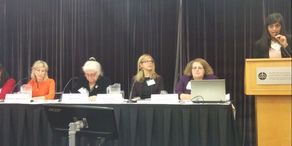 The Ontario Bar Association’s Women Lawyers Forum hosted yet another excellent program in their “Pathways to Power” series. The previous presentations included: Women in Politics, Women on Boards, Women on the Bench and In-house Counsel. This latest program focused on female founding partners and lawyers “who have emerged as successful entrepreneurs and leaders in the legal profession”. The panelists were Mary Eberts (Law Office of Mary Eberts), Fareen Jamal (Jamal Family Law Professional Corporation), Natalie C. MacDonald (Rudner MacDonald LLP) and Robin Parker (Paradigm Law Group LLP). The moderator for the panel was Gabriela Ramo and she was joined by Richa Sandill and Victoria Boucovalas as the program co-chairs. Gabriela’s questions provoked candid and often personal answers dealing with everything from post-partum depression, to divorce, to what role feminism has in their firms. The panel was inspiring and extremely entertaining. Participants left the evening feeling encouraged both by the conversation during the formal part of the evening and also the informal networking that occurred at the post program cocktails. Below are just a few pointers and some advice from the panel on being a female founder in law: 1. Start with Your Values Robin’s first wonderful tidbit was that “you need to surround yourself with people who you inspire to be like”. Later in the program she spoke about surrounding yourself with people with similar values. Robin sat down with her partners when they opened their law firm and did a “core values checklist”. Now, if a crisis happens they can look to their core values and what is important to them as a firm. 2. Perception vs. Reality When asked if the reality of being a female founder matched the perception, the panellists all basically said “yes & no”. Natalie found that the reality exceeded her expectations, but that the amount of work she had to do to get her firm to where it is was “absolutely insane”. Fareen thought she would have more time at home and warned future founders to not fool themselves into thinking that being your own boss means less time at work. “You have to figure out what works for you,” said Fareen. At the beginning she was spending seven nights a week at work. Now, Fareen will burn out after any more than two nights a week. 3. Building a Book of Business Mary spoke about the importance of getting involved in the legal community in order to build your business. She and her partners at the time “threw themselves into the OBA” and went to a lot of meetings. “You can get so wrapped up in your cases that you forget that you are a member of the profession and you can get really isolated” warned Mary. Her main source of work is referrals. It is important to maintain a fellowship with other lawyers. Fareen emphasized the importance of publishing when building a book of business: “Every factum is an article”. Take advantage of the work you have already done and turn it into a marketing piece. Fareen also noted that when she first opened her practice in Oakville she struggled to get the clients she wanted. Everything changed once she became a Deputy Judge. Those two words made her “less female, less brown and less young”. She was able to break into the Oakville market and she now has a firm of seven lawyers. 4. Make Work Life Balance Be What You Want it to Be Mary spoke about “four golden weeks” when she first started her practice where she had “work life balance”. Before her practice got too busy, her kids would stop by after school and hang out in the extra offices at her firm. Once she expanded and other partners joined her, there was no more room for her kids and she “went back to the old routine - but those four weeks were really great”. Natalie is still struggling with work life balance, but suggested surrounding yourself with capable associates as you grow your firm. She trusts them and knows they can do the work. Robin succinctly stated that “Work is life and life is work” and that she has come to truly despise the words “work life balance” (Hear! Hear!). She said, what are your values? You have to decide what you want in life. That is how you make work and life “balance”. 5. Put Fear in its Place When asked what role “fear” had in their careers, Mary confessed that she delayed starting her own firm for a long time. Ultimately it was her clients who told her she had to leave her firm and start her own practice. She warned however that “there will still be days where you wonder where the next file will come from, but that is normal”. Robin concurred, and said everyone feels fear, it is a universal emotion. Women give fear a lot more credit that it is due. Ask yourself, “what am I afraid of, and what can I do about it?” Natalie said our fear should motivate us. Before a trial she can’t eat anything but we overcome our fears by believing in ourselves. 6. Being a Lawprenuer “You need to want to do it” said Natalie if you are planning on starting your own firm. Sit down with yourself and have a “self-talk”. You need to be hardworking, dedicated, and have perseverance in the face of failure. Your personal life will take a backseat sometimes, at least in the early years, but Natalie absolutely loves it. Fareen said it is like having a baby; you have to really want it! Powerful Women: What’s Next? As Gabriela noted, we are graduating women lawyers in record numbers (and have been doing so for a while now) but there are still very low numbers of women in leadership positions within large firms. Perhaps we should stop focusing so much on these numbers and start focusing on all of the awesome and successful female founders who have built their own firms and who have decided to practice law their own way. If the traditional model law firms are not recognizing the business case (and the common sense case) of promoting intelligent and motivated women into management, these firms will only continue to lose these women as they set out to start their own successful (and competitive) businesses. 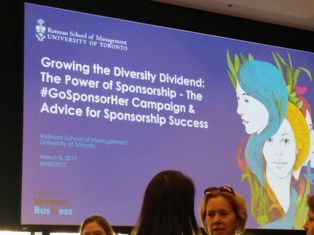 I attended two great events this year for International Women’s Day (IWD - March 8, 2017): one focused on advancing women in the corporate world and the other on advancing women in public service. I left both events feeling energized and hopeful, like I always do listening to brilliant women talking about breaking down barriers and reaching their goals. #GoSponsorHer My first stop was at a breakfast at Rotman School of Management. The topic was “Growing the Diversity Dividend: The Power of Sponsorship – The #GoSponsorHer Campaign and Advice for Sponsorship Success”. I first learned about the #GoSponsorHer campaign and the IWD program on Twitter (if you aren’t on Twitter, join!). #GoSponsorHer is a movement to catalyze sponsorship and increase the number of women in leadership. Participating in this campaign is relatively simple, find a “sponsee” (someone you can sponsor), meet her for lunch or coffee, snap a picture, post it to social media with #GoSponsorHer and challenge 2-3 others to participate as well. The idea being that by making your sponsorship of a woman public, you will be committed to seeing that relationship through. The panel at the Rotman event consisted of Ikram Al Mouaswas (Partner, Deloitte Canda), Megan Anderson (Consultant, McKinsey & Co. & Co-founder of #GoSponserHer), Kirstine Stewart (Chief Strategy Office, Diply), Laura McGee (Consultant, McKinsey &Co and Co-founder of #GoSponsorHer), Bruce Simpson (Senior Partner, McKinsey & Co.), Mark Wiseman (Senior Managing Director, BlackRock), and Miyo Yamashita (Managing Partner, Talent, Deloitte Canada). The moderator was John Stackhouse (Senior Vice-President – Office of the CEO, RBC). First the panel addressed the difference between a mentor and a sponsor, by referring to the common saying that: “A coach talks at you, a mentor talks with you, and a sponsor talks about you”. Ikram however felt that a sponsor should do all three. Kirstine sponsors several women and encouraged the audience to find our own sponsors and to “build a cabinet of people you can draw on on a regular basis”. Laura, as a sponsee, found that it was it important that the relationship was a two-way street and it was imperative to give back to your sponsor. Sometimes it is easier to sponsor a woman outside of your organization, Mark observed (he sponsors Laura), so it doesn’t appear like you are choosing favourites among the people you work with. Ikram commented that a lot of women are afraid to ask for a sponsor or are not sure how to ask. Many may think “Oh my god I am wasting their time”. She encouraged us not to think like this, and to realize that a sponsorship relationship is just as good for the sponsor as it is for the sponsee. It is important, however, that you actually like each other and not every relationship will work out, observed Mark. Kirstine has had to break up with a sponsor and it was like breaking up with her hair-dresser (not a pleasant experience). Megan suggested four steps to find a sponsor: 1) do great work 2) think strategically (what roles in your industry do you aspire to?) 3) make yourself visible to those people (speak up, go to places where they will be, perhaps email with them) and 4) ask! Do you sponsor a woman? Or are you being sponsored? Check out the #GoSponsorHer campaign and consider participating. Law Society of Upper Canada Event: Advancing Women in Public Office The second event I attended was hosted by the LSUC and was co-organized by the Ontario Bar Association’s Women Lawyers Forum, the Women Lawyers Association of Ontario, the Women’s Legal Education and Action Fund (LEAF), and the Barbra Schlifer Commemorative Clinic. The program addressed the following weighty topic: “The prevalence of misogynist and discriminatory language and action in the recent U.S. election campaign reminds us that feminism remains necessary and relevant. The onslaught faced by Hillary Clinton and other women during this campaign is only one example. Canadian women in public life have faced similar abuse.” The discussion was aimed at exploring the barriers women face when running for elected office or engaging in grassroots activism and why more women do not rise to the highest political positions. The program was moderated by Elizabeth Renzetti and the panel consisted of Dr. Tamara Small (a professor of political science at the University of Guelph), Farheen Khan (a Director at the International Development and Relief Foundation and ran as an NDP candidate in the 2015 Federal Election) and Kristyn Wong-Tam (a Councillor with the City of Toronto). Elizabeth immediately hit us with some discouraging numbers: A recent poll found that 60% of Canadians thought that there was the “right number of women in politics” or “too many”. Even though only 25% of the MPs are women and only 18% of mayors are women. 25% of Canadians believe that we will never reach gender parity. Elizabeth also encouraged us to not get too down about these stats and to grab a glass of wine as “bringing down the patriarchy is thirsty work”. Farheen was quite candid about her challenges in running in the federal election as the only candidate who wore a hijab and how she constantly had to prove she was “Canadian” despite being born here. Some people wouldn’t even open their doors to her. Kristyn found knocking on doors was hard for her at first because she found it difficult to use the word “I”. Women tend to find it difficult to talk about themselves. Tamara expressed disappointment at the lack of women running for political office but agreed that politics itself has a “bad rap” and it is a very difficult arena for women to be in, especially, now with the rise of social media and the abuse women face online. Farheen’s team would keep her away from the official social media pages to protect her. A more positive spin on social media came from Kristyn acknowledging that it is just another form of communication and through it you can control your own narrative. She admitted that you are open to more criticism, but this is fine as long as it is fair criticism. As soon as it turns racist, sexist or homophobic Kristyn says her coping mechanism is to “get sleepy”. She can tune it out. All of the panellists were “heartbroken” over the American election. Kristyn was “devastated” but she became resolved and is now dedicated to encouraging and supporting and preparing women to run for public office. Overall the program provided some helpful advice for women considering running for public office. While it will not be easy, we are all responsible to encourage women to run and rise in the political ranks. For some more information on women in politics see my blog on the OBA Women Lawyers Forum’s Pathway To Power event “Women in Politics”. There were so many great events throughout the city and around the world this year for IWD 2017, what event(s) did you attend? 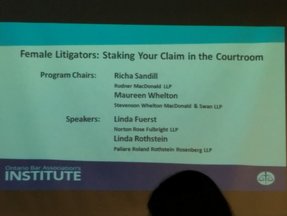 Another great program was presented by the Ontario Bar Association's Women Lawyers Forum, this time jointly with the Civil Litigation section. It was called “Female Litigators: Staking Your Claim in the Courtroom” and it was part of the 2017 OBA Institute. The two hour program was chaired by Maureen Whelton and Richa Sandill and was split into two sessions. The first, “Candid Conversations”, with Linda Rothstein and Linda Fuerst, was indeed candid. While some may be tired of hearing “back in my day the judge called me ‘toots’” talk, I believe that it is important to remind ourselves that not so long ago things were much worse for female litigators. Most lawyers in the room were shocked at the sexist behaviour exhibited by judges and lawyers toward “The Lindas” (as they were affectionately nicknamed) in their early days of practice. Linda Fuerst had to “dress like a woman” in court in order to gain respect from the judges. Comments on their appearance were often made. Linda Rothstein was once interrupted by a judge while she was making submissions in court so he could tell her how nice her nails looked. Both Lindas stuck to their guns, demanded respect, and knew they were worthy of the same respect as their male colleagues. Both also recognized that change occurred when there were more female judges appointed to the bench, but outside the courtroom the discrimination continued. Some takeaways:
The second session was called “Women in the Courtroom: Intergenerational Perspectives on Challenges and Success Strategies” and Shantona Chaudhury, Anne London-Weinstein, Asha James and Sandra Nishikawa were on the panel. I appreciated Sandra’s initial comment that those of us in the room were ultimately very privileged and empowered women. It was important to keep our privilege in mind as we went on to “whine and complain” as Sandra half-jokingly put it. I agree wholeheartedly. The stories from the second panel revealed that in some ways we have come a long way; but in others, not so much. For example, Sandra was recently at the Supreme Court of Canada when, before Court, she was referred to as “the girl” by a senior staff member. While the person later apologized, this is just wrong and disheartening on so many levels. Some of the panellists also spoke from the perspective of being racialized lawyers and how that has affected how they are treated in the courtroom and elsewhere. Sandra is sometimes mistakenly identified as a court translator. Asha finds that racialized lawyers must be extra or over prepared compared to other litigators. A few of the panellists expressed the same sentiment as The Lindas that behaviour outside the courtroom is always worse than in the courtroom as there is no “overseer”. When asked if we should call others out on bad behaviour, the panellists felt that it depended on the context. As women, yes, we should. However, as litigators we have our clients and the case to think about. Is it in your client’s best interest to call out opposing counsel or a judge or adjudicator on their misbehaviour? Perhaps you wait until the case is done. Shantona advised us to know how to “pick your battles”. Is it something egregious? Call them out. Or is it something that can wait? Then, let it wait. As you practice longer, and gain more experience, it is easier to make these calls. If something occurs during a court appearance, Asha suggested calling a mentor for advice when court was on a break. Some takeaways from the second session:
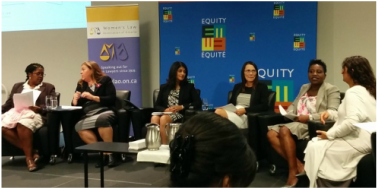 Last month I attended the program “Through the Door and at the Table: Women and Racial Diversity”, part of the Equity Education Series hosted by the Law Society of Upper Canada and the Women’s Law Association of Ontario. This free public event was advertised as a “panel discussion featuring diverse women in a variety of legal careers, including private practice, government, in-house and the judiciary. The panel discussion will touch on issues of gender, race, diversity and inclusion and speak to the ideas of access and power in the legal profession”. How could you not want to go? The event was well attended and had several impressive speakers:
Just a few of the interesting insights provided by the panelists are summarized below:
Overall it was an informative evening, followed by a great cocktail hour where you could “network” or “connect” with others. I found the panelists differing views on networking to be interesting. I do believe that “networking” or “connecting” with others is such an important concept for career advancement. As highlighted by the panel, networking is not just about getting new business in the door. It helps you find that new career position (like Marsha), it helps you get elected as Bencher with the LSUC (like Isfahan), it helps you get appointed to the bench (like Justice Bacchus), etc. If you are interested in learning more about networking and connecting with others in our profession, and how woman may or may not do it differently, please note that the Women Lawyers Forum of the OBA will be hosting an event on December 1st on this very topic. Keep an eye out for an advertisement of the event and more details, which will be announced soon! Last week I attended the OBA Women Lawyers Forum's latest event in its “Pathways to Power” series, this one was on "General and In-House Counsel". The event was also co-hosted by the Ontario chapter of the Canadian Corporate Counsel Association. This was the fourth in the WLF’s series, the previous ones being Women in Politics; Women on Board; and Women on the Bench.
The speakers were Marlene Costa of the Ontario Securities Commission; Susan Kennedy of Ornge; Linda Lam of Advanced Micro Devices; and Aliya Ramji of Figure 1. The program was entertainingly chaired by Melissa Babel of KPMG Law LLP and Jana Pauk of Dentons. Some highlights of the questions and answers at the event:
These are just a few of the great insights this panel offered. I won’t give all of their tips and tricks away; you will just have to attend the next session. Pathways to Power: Female Founders will be held in Spring 2017. [1] Shameless plug for my business here: I help lawyers and law firms with drafting these very important business development and legal content marketing pieces. Outsource your legal newsletter drafting so you can keep working on your billable work! [2] Shameless plug number two: I am also the co-founder of a legal outsourcing business. Flex Legal is a network of experienced (10+ years) freelance lawyers who assist lawyers, firms and in-house legal departments on a contract, project or freelance basis. On June 15, 2016 my husband and I attended a session hosted by the Ontario Bar Association’s Women Lawyers Forum and the Canadian Corporate Counsel Association at Microsoft Canada’s headquarters in Mississauga, called “Gender at Work: Engaging Men as Agents of Change”. The chairs of the program were Sabrina Bandali (Bennett Jones LLP), Nadine Letson (Microsoft Canada), and Amee Sandhu (SNC-Lavalin). The panelists were Marni Dicker (Infrastructure Ontario), Julie Petrini (Microsoft Corporation), and Rich Sauer (Microsoft Corporation).
First, I must say it was refreshing to have just as many men in the room as women when discussing gender imbalance in the workplace. Unfortunately many of the events hosted by women lawyer groups and associations dealing with advancing women tend to attract only women. I think we need to make a real effort to let men know they are invited and encouraged to attend these events as well. Men have a key role in correcting gender imbalance in the workplace. I've seen the difference it makes when men sponsor, mentor, and champion women lawyers. The discussion at the event began with the acknowledgement of the unconscious biases that we all have. We learned that Microsoft uses a theatre troupe to help their employees understand their unconscious biases. I think this would be great for law firms as well. Other topics included maternity/paternity/parental leaves, the importance of mentors and sponsors, getting men involved in diversity initiatives (ask them!) and how to deal with workplace harassment and discrimination, to name a few. Clearly everyone in that room knew of the importance of promoting gender equality in law. There is no dispute that there is a business case for diversity and inclusion. Now, how do we get those who think it is “not their problem” to enter the discussion? Firms and corporations over the last decade or so have used “coaching” for women as one way to try and correct the gender imbalance in law. As a woman lawyer, I’ve been coached on just about everything under the sun. I’ve been coached on how to transition back to work from maternity leave; I’ve been coached on how to business develop and network; and I’ve been coached on how to negotiate at a table with men (Sit up! Lean in! Speak up!). And while I truly appreciate the effort and support, all of this coaching is futile if the head of your department chooses not to return your files to you when you return from mat leave. Or, if the ‘rainmakers’ invite the male associates up to their Muskoka cottages with the clients for networking, but not the female associates. Or, if the senior partners don’t invite you to the negotiating table in the first place. When do these heads of departments, rainmakers, and senior partners get their coaching? They may not even be aware of the impact that their actions can have (both positive and negative) on promoting women in law. I think it is important to continue to have these events, and we need to invite and encourage everyone to participant in the discussion. Congrats to the OBA Women Lawyers Forum and the CCCA on a great program. 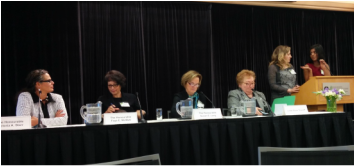 Last night I attended the third program in the series “Pathways to Power” presented by the Women Lawyers Forum of the OBA. Like the previous two programs, Women in Politics and Women in the Boardroom, it was a very informative and inspiring evening. The program was chaired by lawyer Ashley Waye of Waye Law and articling student Richa Sandill of Rudner MacDonald LLP. Richa mentioned that the impetus for this program was a comment by a former Minister of Justice who implied that women and visible minorities were not being appointed to the bench because they just "aren't applying”. The WLF thought this would be a good opportunity to inform women on how to apply (*smirk*). The ever impressive and talented Linda Silver Dranoff was the moderator and she did not shy away from asking the panel challenging questions. The distinguished panel included The Honourable Susan E. Lang (retired) from the Court of Appeal for Ontario, The Honourable Faye E. McWatt, from the Superior Court of Justice of Ontario, and The Honourable Victoria A. Starr, from the Ontario Court of Justice. A highlight of some of the questions and answers from last night:
As usual the evening ended with a great networking cocktail party. I always meet such fascinating and accomplished women lawyers at these events and last night was no exception. I was also excited to learn that there will be more “Pathways to Power” programs in the future: Women General and In-House Counsel in the Fall of 2016; Women in Politics (the Ottawa edition) in the Spring of 2017; and Female Founders in Spring 2017. I hope to see some of you at these upcoming events. |
Erin C. Cowling is a former freelance lawyer, entrepreneur, business and career consultant, speaker, writer and CEO and Founder of Flex Legal Network Inc., a network of freelance lawyers.
Categories
All
Archives
June 2024
|
|
(C) 2014-2024 Cowling Legal. All rights reserved.
|
Please note I am not currently practicing law.
Information on this website does not constitute legal advice and is for informational purposes only. Accessing or using this website does not create a solicitor-client relationship. See website Terms of Use/Privacy Policy. |

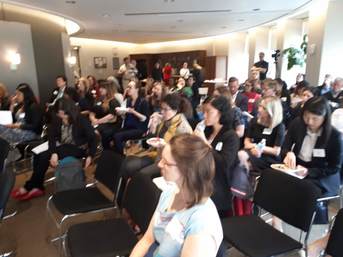
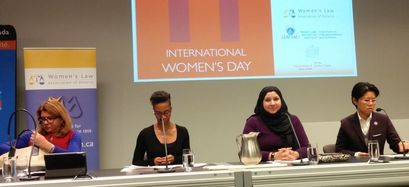
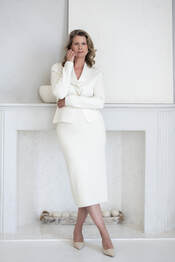





 RSS Feed
RSS Feed
